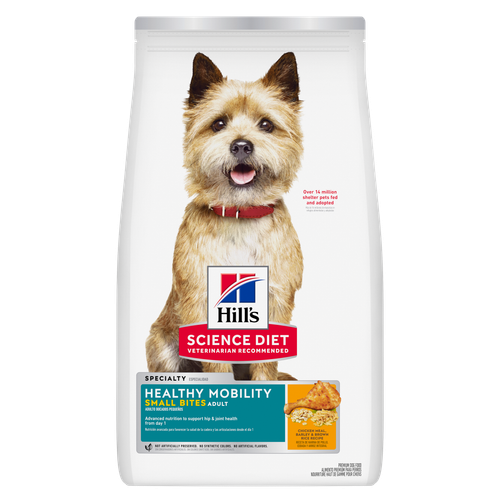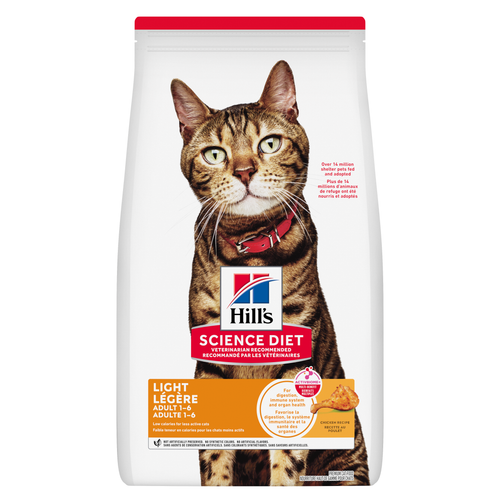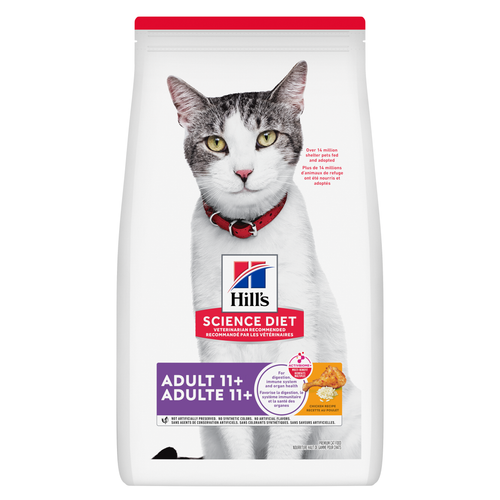
-
Find the right food for your petTake this quiz to see which food may be the best for your furry friend.Find the right food for your petTake this quiz to see which food may be the best for your furry friend.Featured products
 Adult Healthy Mobility Small Bites Chicken Meal, Barley & Brown Rice Recipe Dog Food
Adult Healthy Mobility Small Bites Chicken Meal, Barley & Brown Rice Recipe Dog FoodAdvanced nutrition to support hip & joint health from day 1
Shop Now Adult Sensitive Stomach & Skin Small & Mini Chicken Recipe Dog Food
Adult Sensitive Stomach & Skin Small & Mini Chicken Recipe Dog FoodHill's Science Diet Sensitive Stomach & Skin Small & Mini dry dog food is tailored nutrition for Small & Mini dogs while being gentle on stomachs. Nourishes skin & promotes a lustrous coat.
Shop Now Adult Light Large Breed Chicken Meal & Barley Recipe Dog Food
Adult Light Large Breed Chicken Meal & Barley Recipe Dog Food18% lower calories vs. Science Diet Large Breed Adult
Shop NowFeatured products Adult Light Chicken Recipe Cat Food
Adult Light Chicken Recipe Cat Food20% lower calories vs. Hill's Science Diet Adult
Shop Now Adult Healthy Cuisine Seared Tuna & Carrot Medley Cat Food
Adult Healthy Cuisine Seared Tuna & Carrot Medley Cat FoodDelicious seared tuna paired with tender carrots in a mouthwatering sauce
Shop Now Adult 11+ Chicken Recipe Cat Food
Adult 11+ Chicken Recipe Cat FoodSupports brain health & beautiful fur. Helps keep immune system, heart & kidneys healthy.
Shop Now -
Dog
- Dog Tips & Articles
-
Health Category
- Weight
- Food & Environmental Sensitivities
- Urinary
- Digestive
- Joint
- Kidney
- Dental
- Cancer
-
Life Stage
- Puppy Nutrition
- Adult Nutrition
- Senior Nutrition
Cat- Cat Tips & Articles
-
Health Category
- Weight
- Skin & Food Sensitivities
- Urinary
- Digestive
- Kidney
- Dental
- Stress
- Cancer
-
Life Stage
- Kitten Nutrition
- Adult Nutrition
Featured articles Antioxidants
AntioxidantsUnderstand the importance of antioxidants in your dog or cat's food, and how they can help protect your pet and keep them healthy.
Read More Water
WaterDiscover why water is the most important nutrient for your dog or cat to live a healthy life. Find out how much water your pet should consume each day.
Read More Importance of DHA in your Pet's Food
Importance of DHA in your Pet's FoodLearn about DHA, Docosahexaenoic Acid, a natural omega-3 fatty acid that is essential in the development of the brain and nervous system in cats & dogs.
Read More -


In the U.S., giardiasis is the most common intestinal parasitic disease among humans, reports the Centers for Disease Control and Prevention (CDC). But did you know that giardia can also wreak havoc on the intestines of your beloved cat?
Though sometimes confused with intestinal worms, giardia is actually a type of parasite called a protozoan that invades the gastrointestinal tract. Though the parasite can cause severe diarrhea, giardia in cats treatment is typically very effective and carries a great prognosis.
How Do Cats Get Giardia?
There is little research about how giardia causes disease in cats, so much of the information that veterinarians have is based on studies of giardia in humans. It is believed that cats become infected with giardia when they swallow the organism in its immature state. Once inside the cat's intestine, the organism matures into a cyst. Eventually, the cat passes more infected cysts in their stool. If other cats come in contact with the stool, they can get infected. Cats may also ingest giardia in contaminated drinking water, outdoor puddles, or ponds.
Symptoms of Giardiasis
Many cats who become infected with giardia are asymptomatic, meaning they don't show any signs of illness. Kittens, old cats and cats who are stressed, have a weakened immune system or are housed in close quarters are most likely to show signs of clinical illness. These signs can include severe, watery diarrhea and weight loss. Giardiasis can be fatal if left untreated.
How Is Giardiasis Diagnosed?
Giardia in cats can be detected through a microscopic examination of their stool for ova and parasites. Occasionally, the parasites may be seen on a direct smear of the feces. If giardia is suspected, your vet can test your cat's blood or feces for specific antigens of giardia. These tests are more accurate than the stool exam but take longer, as the sample usually needs to be sent to an outside laboratory.
What is the treatment for Giardia?
In the U.S., no drug is officially approved for the treatment of giardia in cats. However, the typical cat giardia treatment is metronidazole, an antibiotic, which cats usually need to take for five to seven days. Your vet may also suggest another similar medication, like albendazole or fenbendazole.



Tasty Tips
Eliminating Giardia
If your cat is diagnosed with giardiasis, environmental disinfection is key to preventing them from getting reinfected and from infecting you, says the CDC. First, remove your kitty from any potentially contaminated areas. To clean the space, use a diluted chlorine bleach solution of one cup of bleach in a gallon of water. Alternatively, you can steam or chemically clean with a disinfectant containing quaternary ammonium. Giardia cysts easily die in dry conditions, so keep the area as dry as possible for several days.
Your cat's coat may also be carrying giardia. The best way to remove the organisms from their coat is by bathing them with a pet shampoo and thoroughly rinsing. After this initial bath to remove organic material, you should bathe them again with a quaternary ammonium disinfectant. Limit application to three to five minutes, as prolonged contact with this chemical can irritate a cat's skin and mucous membranes. After bathing them, paying close attention to the anal region, thoroughly rinse off the solution. Because bathing cats is rarely an easy task, you might wish to have your vet do this. If your cat is too stressed, gentle sedation can be administered by your veterinarian.
Vaccination and Prevention
To date, no drug has been shown to convincingly prevent cats from giardiasis. While there is a reported giardia vaccine available, there isn't enough evidence to determine its efficacy. While one study showed that young kittens who received the vaccine were immune to infection six to 12 months later, the vaccine has been shown to lead to local reactions. Other studies suggest that the vaccine may not be successful in cats who are already infected and may fail to prevent reinfection.
The best prevention remains environmental control, which includes decontaminating potentially infected areas of your home and ensuring there are no giardia organisms on your cat's coat. Additionally, the best line of defense is understanding your cat's normal behavior and health. Any signs that it is changing, you should contact your veterinarian to get their expert opinion.


Dr. Laci Schaible is a small animal veterinarian, veterinary journalist, and a thought leader in the industry. She received her Doctor of Veterinary Medicine from Texas A&M University and her Masters in Legal Studies from Wake Forest University.
Related products

Supports brain health & beautiful fur. Helps keep immune system, heart & kidneys healthy.

20% lower calories vs. Hill's Science Diet Adult

With delicious chunks in a decadent gravy

Delicious seared tuna paired with tender carrots in a mouthwatering sauce
Related articles

Discover how to train your cat, starting with very basic first steps that both reward good behavior and discourage the bad.

Discover the benefits of Hill's line of kitten foods and how they provide complete and balance nutrition for growing kittens.

When you adopt a cat, you don't just gain a best friend; you also save her life. Here's why getting a cat from a local animal shelter makes so much sense.

Cats are naturally very clean and chances are your kitten will already have learned how to use the litter box from her mother before she comes to live with you.

Put your cat on a diet without them knowing
Our low calorie formula helps you control your cat's weight. It's packed with high-quality protein for building lean muscles, and made with purposeful ingredients for a flavorful, nutritious meal. Clinically proven antioxidants, Vitamin C+E, help promote a healthy immune system.
Put your cat on a diet without them knowing
Our low calorie formula helps you control your cat's weight. It's packed with high-quality protein for building lean muscles, and made with purposeful ingredients for a flavorful, nutritious meal. Clinically proven antioxidants, Vitamin C+E, help promote a healthy immune system.

